I mentioned last Monday that this month, rather than sharing all of my monthly reviews within a single week, I’m spreading them out throughout the month. Part One came last week, and today we’ve got Part Two of June’s quick(ish) book reviews. These six books were all great reads that either entertained or seriously made me think. I learned a lot from these titles, which is always a sign of a good book.
The Woman in the Window, by A. J. Finn: Anna Fox once made a living helping others with their mental disorders, but for the past ten months, the former psychologist has been held prisoner by the trauma-induced agoraphobia that keeps her confined to her brownstone in New York City. Anna spends her days watching old Alfred Hitchcock films, drinking excessive amounts of alcohol, talking to her daughter and husband (who no longer live with her), and spying on her neighbors. When the Russels move into the house across away, they seem like a perfect family, and Anna enjoys getting to know both the mother, Jane, and their teenage son, Ethan. Then Anna believes she has witnessed a crime committed in the Russels’ home, but nobody believes her, and soon Anna is questioning the event herself. She has no idea what is real, and whether or not she is in danger. Nothing is as it seems.
This novel is being touted as the “biggest thriller of 2018.” It’s got a lot going for it: an unreliable narrator (those are all the rage these days), connections to Alfred Hitchcock, mental illness, a New York City setting. I liked the premise, particularly the ties to Rear Window (my favorite Hitchcock film), but the book didn’t quite live up to my expectations. It felt too drawn out, with way too much build up to the primary plot point (the crime Anna believes she has witnessed) and even more unnecessary suspense-building to the climax at the end. (I felt similarly about The Breakdown, a read-alike that’s also popular right now.) I suspected a couple of the big “twists” very early on, and while the ending surprised me, it took too long to get there. I can see why so many people are loving this book, but it definitely isn’t the best of its genre.
My Rating: 3.5 stars.
Hunger: A Memoir of (My) Body, by Roxane Gay: Hunger is, as the title suggests, the story of one woman’s relationship with her body. Roxane Gay is a successful author and proud feminist, but for decades she’s waged an ongoing battle with her “wildly undisciplined” body. With uncomfortable vulnerability and remarkable self-awareness, Gay shares details of the trauma she endured as a preteen and how that incident led to her to find safety and security in a larger body, eventually reaching nearly 600 pounds. Gay shares candidly about the practical difficulties of existing in a large body and her mixed emotions related to her size. She explores the topics of diet culture and obesity from both a societal and deeply personal perspective, and she draws many conclusions that she herself finds hypocritical yet necessary.
This is not an easy review for me to write: on the one hand, I commend Gay for her courage in sharing with such brazen candor. She bares her deepest hurts and insecurities, something that is never easy to do, particularly when they are related to such an intimate and polarizing issue as one’s body size. She admits that she is still in the middle of her journey; she is not sharing from her scars, but from open, oozing wounds. This is a frightening place from which to write, and while it makes for difficult reading, it is indeed powerful. I also admire Gay’s willingness to acknowledge the discrepancies between her PC convictions (à la Health at Every Size, etc.) and her own desires to be in a smaller body; I believe she has found—or at least is trying to find—a fairly healthy balance between accepting her body and also wanting to make changes.
While I don’t wish to diminish Gay’s story or her bravery in sharing it, I would be remiss not to mention why I didn’t LOVE this book. Simply put, I didn’t find the writing style to be very compelling. The memoir reads like a first draft, and the sterile narration and repetitive stream-of-consciousness style just didn’t work for me. I also had a VERY hard time with Gay’s wholehearted acceptance of her victimhood; she matter-of-factly states that she would rather be called a victim than a survivor, and while I don’t want to discredit her horrific trauma, I struggle to understand her decision to embrace a lifelong victim mentality.
Roxane Gay and I have very different bodies: hers is remarkably larger than most bodies, mine is noticeably smaller. But our experiences with our eating disorders are not as different as one might think. I was surprised by how much I resonated with her thoughts on doctor’s offices, diet culture, and internal food wars. I do not suffer the same stigmas she endures, but I’ve shared many of her fears.
I learned a lot from this memoir: about the challenges faced by someone in a larger body, about how to treat others with compassion and empathy, and about the ways in which our bodies tell stories that our brains might not recognize or understand. Gay’s words left me feeling convicted about my own weight stigma and unhealthy attitudes that need to be addressed.
While this isn’t my favorite memoir, it is one that I would recommend to anyone who has struggled with their body (isn’t that all of us?) or is close to someone who has.
My Rating: 3.5 stars.
Force of Nature, by Jane Harper: Force of Nature is the highly anticipated follow-up to The Dry. While I didn’t love Jane Harper’s debut as much as everyone else seemed to (it was good, but nothing particularly special), I was still eager to see more of the Australian Police Agent Aaron Falk.
The novel begins with five women on a corporate retreat through the wilderness. Five colleagues entered the woods; only four returned. In alternating chapters we follow Falk’s investigation and search for the missing woman, while also getting flashbacks to the women’s time in the woods. We learn that none of the women were particularly chummy, that each had secrets she would rather keep hidden, and that the isolated forest wasn’t their only nemesis.
This is a smart and suspenseful thriller with an evocative setting and great narrative drive. The beginning was a little slow for me, as I had trouble keeping the five female characters straight, but the story quickly picked up and swept me into the Australian outback. I enjoy Harper’s writing style, which I would describe as a mash-up of Tana French’s eeriness with Liane Moriarty’s wry social insights.
My Rating: 4 stars.
Girl, Wash Your Face: Stop Believing the Lies About Who You Are so You Can Become Who You Were Meant to Be, by Rachel Hollis: My MOPS group started a book club, and this was our first pick. It was already on my TBR and I was glad for the opportunity to read it sooner than I otherwise would have.
Rachel Hollis is a successful novelist, the founder of a large lifestyle website and media company, and a well-known figure in the Christian/lifestyle/mommy blogger circles. She’s also just thirty-four years old, a trauma survivor, and never earned more than a high school degree; talk about an unexpected success story. In Girl Wash Your Face, Rachel shares twenty lies that she has believed at various points in her life (about her body, her self worth, her relationships, and her own abilities), then outlines the steps she took to overcome them.
Rachel’s specific journey is an unusual one, but the demons she’s been forced to confront are nearly universal. I don’t know a woman who hasn’t wrestled with insecurity and self-limiting beliefs; Rachel’s stories are inspirational, and her advice is deeply practical. Not only does she tell readers what to do, but she proves to them (through her own candid testimonies) that it is possible.
I admire Rachel’s success as well as her vulnerability in sharing her highs and lows in this book. She isn’t afraid to expose the darkest parts of her story (from her brother’s suicide and her emotionally abusive relationships, to her over-dependence on alcohol and her nightmarish adoption journey), and I found her candor a little uncomfortable but also refreshing. I also loved her humor and her ability to blend empathy with (sometimes very harsh) advice. I had takeaways from nearly every chapter and was left feeling motivated to relinquish my excuses, stop playing the victim, and start living up to my potential.
The book’s summary states that Rachel “speaks with the insight and kindness of a BFF”, but I’d have to disagree. As much as I loved the book, I am almost certain we would NEVER be BFFs. Rachel’s confidence verges on arrogance, and while I do think her “tough love” approach makes a good counterbalance to many of the softer advice books out there, it was sometimes a little much for my sensitive self. This book is like the super tough trainer at the gym that you know will help you achieve your desired results, but isn’t exactly someone you’ll ask to join you for coffee after the workout. I would definitely love to place this book in the hands of almost every woman I know, with the caveat that they might experience some severe muscle soreness after reading.
My Rating: 4.5 stars.
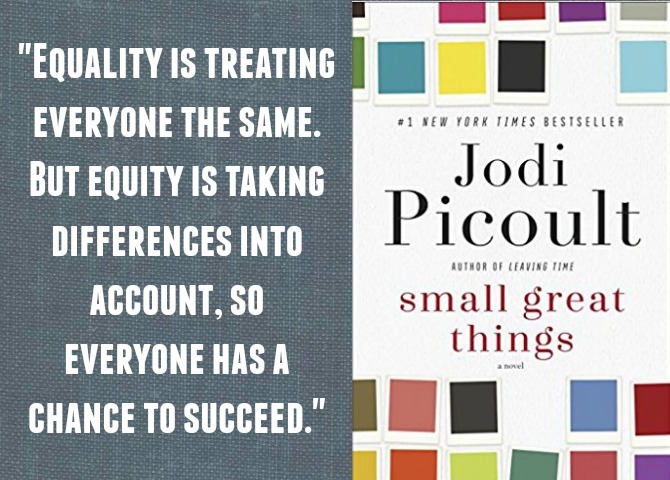
Small Great Things, by Jodi Picoult: Ruth Jefferson is a labor and delivery nurse at a Connecticut hospital, where she has worked for more than twenty years. During an ordinary shift, she is met with hostility from the parents of one of her infant patients; she is later told by her supervisor that the patient has been removed from her care at the request of his white supremacist parents, who do not want Ruth (who is African American) touching their child. The next day, the baby goes into cardiac arrest and Ruth is faced with an impossible decision: save the baby’s life, which would be going against orders and could jeopardize her career? Or watch as an innocent child dies. Ruth chooses to do all that she can to save the baby, but the patient dies, and Ruth finds herself being charged of murder.
Kennedy McQuarrie is the white public defender who takes on Ruth’s case. Kennedy insists that mentioning race in court will be a self-defeating defense strategy. As the trial unfolds, and Ruth’s personal life falls to pieces, both women realize there is a lot they don’t know or understand about how race is coloring their perspective and is at the root of not just this trial, but so much of life.
This is one of the most difficult novels I’ve read in recent memory, possibly ever. The first few chapters alone—with their graphic descriptions of a newborn’s death—just about did me in. Then there was Turk, the white supremacist who narrates much of the novel. It was challenging and at times revolting to experience the story through his hate-filled eyes, and I was made aware of the appalling attitudes of this demographic at a level that I’d never understood.
The most challenging aspects of this book were the race issues that are at its core. Small Great Things addresses this topic head-on, and forced me to confront a lot of racial bias I hadn’t known existed within me. This book (as well as other sources, including this podcast, my Reading Challenge selection for next month, and general discussions taking place in our world right now) are forcing me to accept my own white privilege. But now that I have this awareness, what do I do with it? How do I make amends? Small Great Things didn’t leave me with a lot of answers; if anything, it left me feeling even more angry and frustrated, towards the systemic issues we are facing, toward the history that has brought us here, and also at the fact that anything I do or say or believe as a white person can be perceived as racist or at the very least inadequate. I want to help, but I don’t know how; or where I do know how, I feel like my hands are tied. This is frustrating and has been weighing very heavily on me. My only solution now is to keep asking questions, to keep educating myself—and a big part of that process is reading hard stories about people of color. . . stories like this one.
While deeply convicting and also maddening (because of the reasons I stated above, and also because the characters themselves—both white and black—ALL infuriated me at some point in the novel), Small Great Things was also compulsively readable. Picoult has woven heavy, important themes into a story that is riveting and heartbreaking. Her characters are wonderful (even when they were driving me a little crazy) and I enjoyed following their personal trajectories as the story progressed.
My one big hangup with the book is that the author herself is a white woman. Picoult addresses this “problem” in the Afterward, where she presents her reasons for writing this book in spite of her whiteness. I understand that Picoult conducted a great deal of research that informed her writing, and I appreciate her heart on the issue, but I would put more trust and credibility in this story if it had come from someone of color who had personal experience with the racism addressed.
My Rating: 4.5 stars.
No-Drama Discipline: The Whole-Brain Way to Calm the Chaos and Nurture Your Child’s Developing Mind, by Daniel J. Siegel and Tina Payne Bryson: I’m on a roll with the parenting books lately: partly because this current stage with Charleston has left me scrambling for new disciplinary tactics, but also because I find that simply reading about parenting (regardless of the book’s content) keeps the topic at the forefront of my mind and makes me a better parent. My therapist recommended No-Drama Discipline to me after I mentioned reading Love and Logic and said that it might make a good follow-up.
No-Drama Discipline begins by redefining discipline as instruction, not punishment; when we discipline our children, the end-goal isn’t to shut down a behavior (as happens with punishment) but to teach skills that will last a lifetime. The authors go on to explain that the brain is divided into two parts (the primitive “downstairs brain” and the “upstairs brain” that is responsible for thinking, emotional, and relational skills) and they show parents know how to tap into that upstairs brain in their discipline. The rest of the book is spent outlining how parents can discipline by first connecting with the child and then redirecting behavior.
This book’s foundation is excellent. I particularly enjoyed getting a better understanding of how Charleston’s brain works (and my own, too!); the explanations are straightforward and shed light on some areas where I personally have been going wrong with my discipline. And a lot of the advice is really great, focusing on big-picture outcomes and helping parents know how to establish healthy relationships rather than punitive ones. This is at the core of a lot of parenting books, but this book’s brain science component really helped me to see how and why it works.
No-Drama Discipline is definitely lacking in some areas, though. For one thing, it is WAY too long. The useful information could easily have been consolidated into a single pamphlet (this cheat sheet pretty much sums it up); there is a lot of fluff, repetition, and unnecessary stories. My other dislike is that the authors frequently reference the setting of healthy boundaries and limits, but they don’t explain what those look like and how they would specifically tie in to the whole-brained approach. I would have liked more practical advice and less ideology.
This book did make a good follow-up to Love and Logic, as the books offer different perspectives on a similar parenting style. We’ve been using a combination of ideas from both books, and I’m happy to report that things have been going much more smoothly in our household!
My Rating: 3.5 stars.
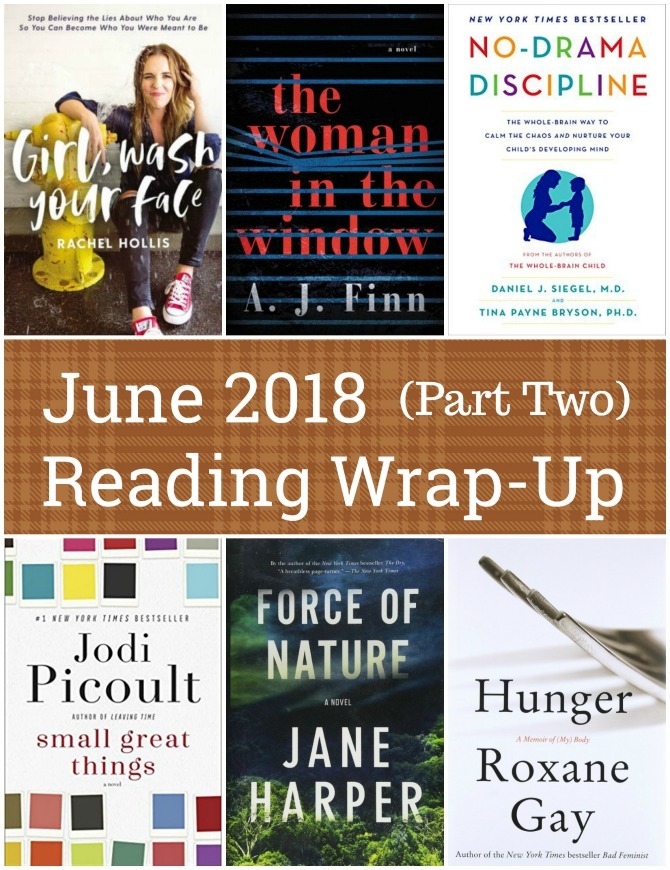
I’m linking up with Modern Mrs. Darcy to share what we’ve been reading lately. If you’re here from the linkup, thanks for stopping by! Leave a comment and say hi! And please be sure to check out Part One of this month’s Quick Lit, which I shared last week.
Next Monday I’ll have reviews of the final six books I read in the last month, including this spiritual heavy-hitter, and this parenting book, which is one of my favorites that I’ve read all year!
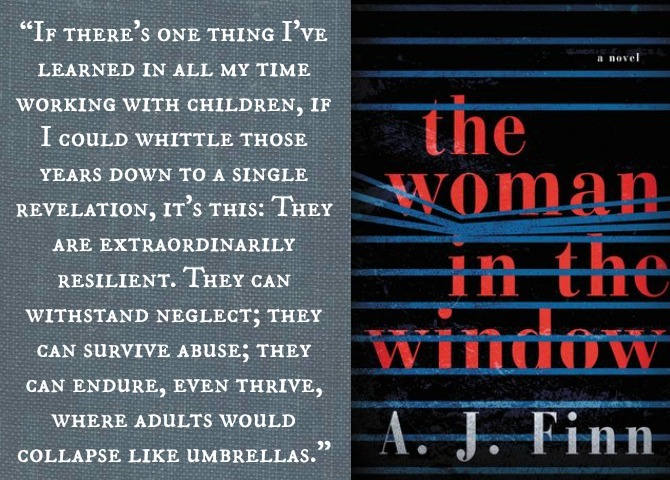

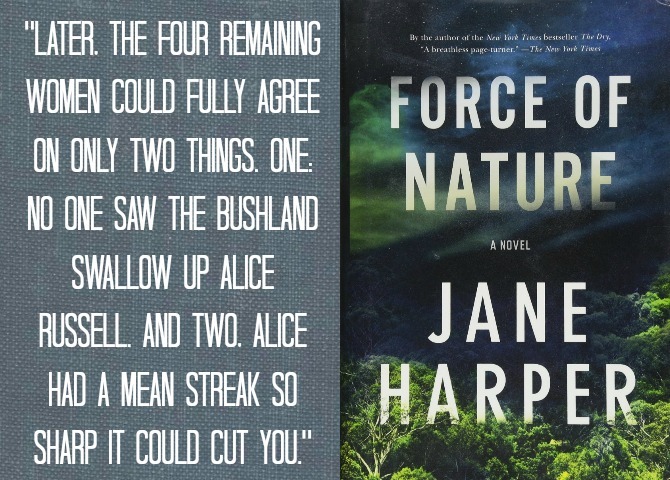
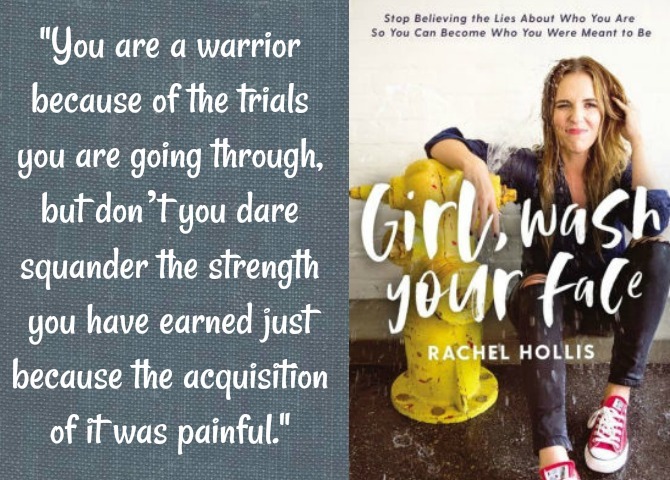
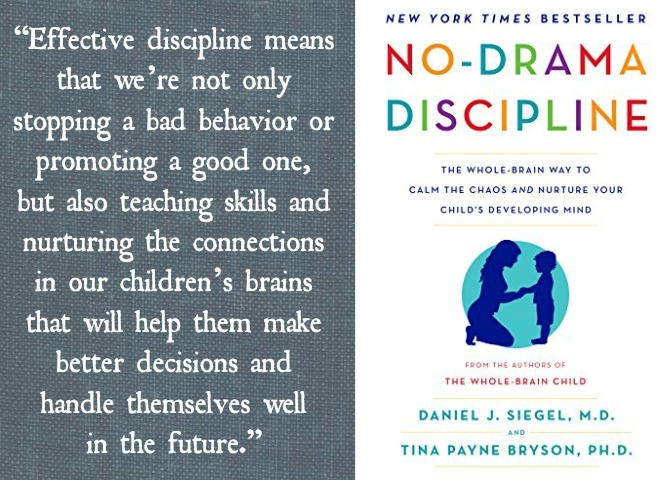
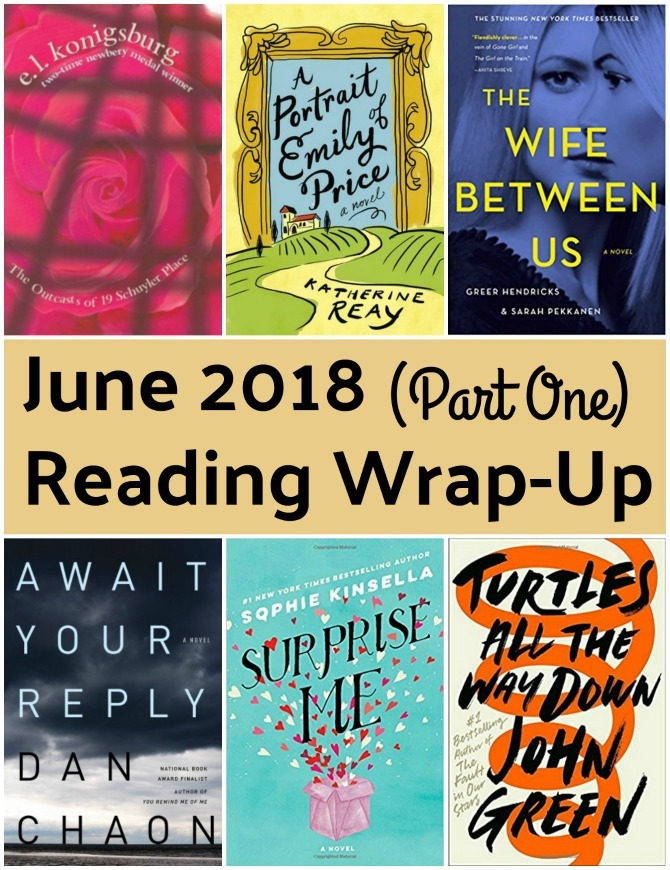
[…] Small Great Things, by Jodi Picoult ~ Compulsively readable, this is the story of a black nurse and what happens when she attempts to save the life of a white supremacist’s son. This would be my top recommendation of the year for a discussion-worthy Book Club selection. (Review) […]
[…] installment of this month’s quickie book reviews. (You can find part one here and part two here.) This batch is split evenly between fiction and nonfiction, and my opinions were as diverse as the […]